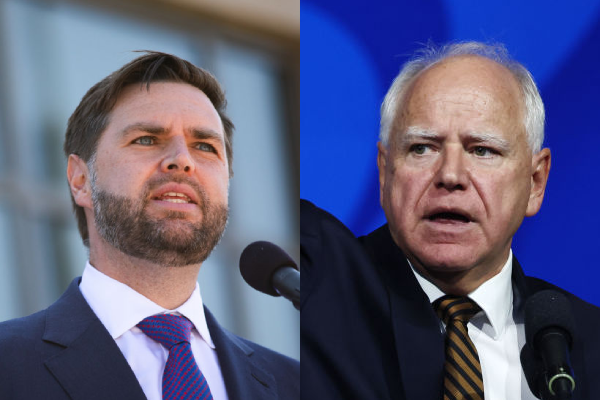Washington — The vice presidential debate hosted by CBS News is set for Oct. 1 in New York City, with Democratic Gov. Tim Walz of Minnesota and GOP Sen. JD Vance of Ohio both agreeing to participate.
On Wednesday, CBS News proposed four dates for a debate between the two vice presidential nominees: Sept. 17, Sept. 24, Oct. 1, and Oct. 8. The Harris-Walz campaign soon agreed to the Oct. 1 date.
“See you on October 1, JD,” Walz wrote on X. A campaign official said Walz “looks forward to debating JD Vance — if he shows up.”
On Thursday, Vance posted on social media that he accepted the CBS News debate on Oct. 1, and said he also wanted to debate on CNN on Sept. 18.
“The American people deserve as many debates as possible, which is why President Trump has challenged Kamala to three of them already,” Vance wrote on X. “Not only do I accept the CBS debate on October 1st, I accept the CNN debate on September 18th as well. I look forward to seeing you at both!”
In an interview with Fox News’ Laura Ingraham on Wednesday evening, Vance said he was open to debating Walz on Oct. 1, but did not firmly commit to the date.
“We’re certainly going to debate Tim Walz. We just heard about this thing three hours ago, so we’re going to talk to them and figure out when we can debate,” Vance said. “We want to actually look at the debates, look at the moderators, talk about the rules a little bit.”
Vance continued: “I strongly suspect we’re going to be there on October 1, but we’re not going to do one of these fake debates, Laura, where they don’t actually have an audience there, where they don’t actually set the parameters in a right way, where we can have a good exchange of ideas.”
Vance also said that he wanted to debate Walz more than once.
“Hopefully we’re going to see him on Oct. 1, but hopefully we’re going to see him either before or after that because I think it’s important for the American people to actually see us discuss our views,” he told Ingraham.
The vice presidential debate
A date for the vice presidential debate has been in limbo since the spring, when CBS News first extended the invitation to both presidential campaigns. In May, President Biden’s campaign said Vice President Kamala Harris, who was still his running mate at the time, was willing to face off against the eventual Republican vice presidential nominee on either July 23 or Aug. 13.
Former President Donald Trump picked Vance as his running mate on July 15, the first day of the Republican National Convention. His campaign soon declined to commit to a vice presidential debate before the Democratic National Convention on Aug. 19, saying that doing so would be premature since Harris might end up being the Democratic nominee.
Mr. Biden dropped out of the race on July 21, several weeks after his own poor showing at his debate with Trump. Harris quickly gathered the support needed to replace him atop the Democratic ticket and formally captured the nomination last week. She named Walz as her running mate, finalizing the vice presidential picks for both campaigns and kicking off a sprint to the election in November.
Last week, Trump said CBS News would host the vice presidential debate, and that Vance has “really stepped up” and is “doing a fantastic job.” He added that he was willing to participate in three debates with Harris in September, hosted by Fox News, ABC News and NBC News. The Harris campaign previously committed to one debate, the Sept. 10 meeting on ABC.
This year is the first election cycle since 1988 in which the debates are not being organized by the nonpartisan Commission on Presidential Debates. In 2022, the Republican National Committee voted to ban GOP nominees from participating in debates hosted by the commission, accusing the organizers of bias in the two 2020 meetings between Mr. Biden and Trump.
Instead, television networks have been left to negotiate dates and terms for the debates directly with the presidential campaigns. CNN hosted the first debate of the cycle between Mr. Biden and Trump in June, a much earlier start than in previous election years. CNN allowed other networks to carry the debate on their airwaves, in keeping with the practice for debates hosted by the commission.

